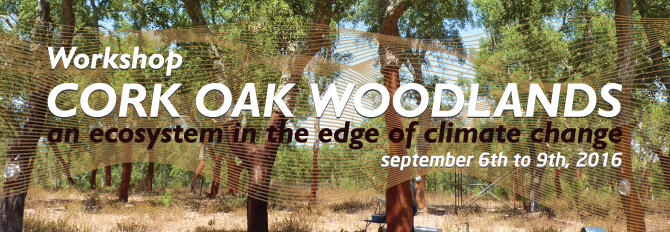Workshop - Cork oak woodlands: an ecosystem in the edge of climate change

Organised by: University of Lisbon, School of Agriculture (ISA), Portugal
Date: September 6 – 9, 2016. Registration before August 16 - NEW DATE
Location: University of Lisbon, School of Agriculture (ISA), Tapada da Ajuda, 1349-017 Lisbon, Portugal
Objective of the workshop: The main objective of the workshop is to present cork oak woodlands to the participants highlighting aspects as: climate change, genetic variability, ecophysiology and ecosystem threats.
Trainers/speakers:
- MSc. Ana Fonseca, Instituto de Ciências Agrárias e Ambientais Mediterrânica, U. Évora.
- Dr. Filipe Costa e Silva, CEF, ISA, U. Lisboa
- Prof. Helena Pereira, CEF, ISA, U. Lisboa
- Dr. Joana Paulo, CEF, ISA, U. Lisboa
- Dr. José Graça, CEF, ISA, U. Lisboa
- Dr. José Matos, Instituto Nacional Investigação Agrária Veterinária
- Prof. Leonor Morais, Leaf, ISA, U. Lisboa
- Prof. M Helena Almeida, CEF, ISA, U. Lisboa
- Prof. Manuel Madeira, CEF, ISA, U. Lisboa
- Prof. Manuela Branco, CEF, ISA, U. Lisboa
- Prof. Margarida Tomé, CEF, ISA, U. Lisboa
- Dr. Maria Conceição Caldeira, CEF, ISA, U. Lisboa
- Dr. Miguel Bugalho, CEABN, ISA, U. Lisboa
- Prof. Pedro Miranda, U. Lisboa
- Dr. Teresa Soares David, Instituto Nacional Investigação Agrária Veterinária; CEF, ISA, U. Lisboa
Fees: 75 € (no Evoltree partner members) | 30% reduction for ISA students and employees (teachers and staff)
Number maximum 20 and minimum 8 participants
Credit for students: 3 credits
Outline of the course: The course will be organized in lectures, participants’ oral presentations followed by roundtable sessions, visit to laboratories where cork oak studies are being conducted, and one day field trip.
Participants should focus their oral presentations on the main workshop topics and preferably on cork oak woodlands, although not mandatory.
A short abstract (maximum 300 words) should be sent with registration until August 16. Examples of presentation topics:
- research regarding Mediterranean ecosystems and threats;
- ongoing research on cork oak or research in preparation;
- cork oak research you would like to discuss with trainees/trainers
Meals are not included. Lunches will be served at ISA Campus but the dinners on their own. During the field trip, lunch (sandwich and fruit) will be provided by the University.
Travelling: The School of Agriculture (ISA) is located 12 km apart from Lisbon airport. Travel options are subway connection to the city center or bus to the School. Participants are expected to arrive on Monday evening (September 5) and depart on Friday evening or Saturday (September 10).
Programme
| Tuesday - 6th Sep | Wednesday - 7th Sep | Thursday - 8th Sep | Friday - 9th Sep | |
| Morning | Introduction: Climate change, cork oak woodlands and cork | How do trees cope with climate changes – scenarios and responses | Field Trip | Hands on: modelling |
| Afternoon | Cork oak, origin and genetic and epigenetic variability | Cork oak woodlands: dealing with threats | Laboratory |
Schedule:
Tuesday 6th Sept.
9:00-10:00 Welcome participants at ISA. Introduction and overview.
10:00-10:40 Climate Change Scenarios in the Mediterranean Regions – P. Miranda
10:40-11:00 Break/discussion.
11:00-11:40 Cork oak woodlands - Historical and social overview – A. Fonseca
11:40-12:20 Cork - how it grows? – J. Graça
12:20-13:00 Participants presentation and roundtable.
13:00-14:30 Lunch.
14:30-15:10 Cork oak Genetic Differentiation and Diversity – J. Matos
15:10-15:50 Is epigenetic variability involved in cork quality? – L. Morais
15:50-16:10 Break/discussion.
16:10-16:50 Genetic variation of Quercus suber: a tool for regeneration of cork oak woodlands – M.H. Almeida
16:50-17:30 Participants presentation and roundtable.
Wednesday 7th Sept.
9:30-10:10 Impact of root structure and functioning of root system in tree water use – T.S. David
10:10-10:50 Climatic variability in the cork oak woodlands: effects on carbon sequestration – F. Costa e Silva
10:50-11:10 Break/discussion.
11:10-11:50 How to naturally regenerate cork oak woodlands? – M.C. Caldeira
11:50-12:30 Participants presentation and roundtable.
12:30-14:00 Lunch.
14:00-14:40 Cork oak management systems. Soil quality and sustainability – M. Madeira
14:40-15:20 Cork oak pests and pathogens: what we know what is missing? – M. Branco
15:20-15:40 Break/discussion.
15:40-16:20 Effect of climate events on cork oak growth and cork quality – H. Pereira
16:20-17:00 Sustainable management of cork oak woodlands: conservation of biodiversity and ecosystem services – M. Bugalho
17:00-17:40 Participants presentation and roundtable.
Thursday 8th Sept.
9:00-18:00 Field trip: Companhia das Lezírias (Reforestation/restoration) M C. Caldeira, T. S. David, C. A. Pinto
Friday 9th Sept.
9:30-10:20 Cork oak stands growth modelling – M. Tomé
10:20-10:40 Break/discussion.
10:40-11:40 Suber Model a tool to support cork oak stands management – J. Paulo
11:40-12:30 Participants presentation and roundtable.
12:30-14:00 Lunch.
14:00-14:30 Laboratory – H. Pereira
14:30-15:00 Synthesis and end of the workshop
Grants
All the EVOLTREE members (i.e., participants from EVOLTREE partner labs) can apply for financial support to cover travel, accommodation and meals during the workshop.
Contact persons: Prof. Maria Helena Almeida; nica@isa.ulisboa.pt,


